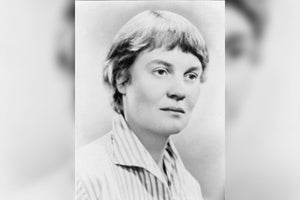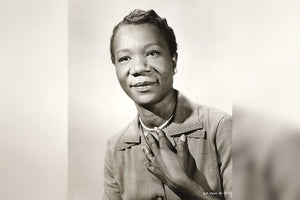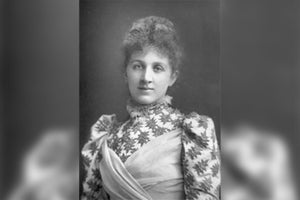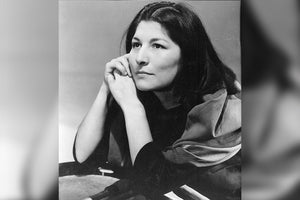Birthday: February 8, 1911
Who is Elizabeth Bishop?
Elizabeth Bishop was a writer of short stories and a multi-awarded American poet. Dwight Garner referred to her as perhaps the 20th century's "most purely gifted poet." From 1949-1950, Bishop was Consultant in Poetry to the Library of Congress. In 1956, she won a Pulitzer Prize for Poetry.
In 1970, she was given the National Book Award, and in 1976, she bagged the Neustadt International Prize for Literature. Her three most admired qualities in poetry were mystery, spontaneity, and accuracy.
Five Facts about Elizabeth Bishop
- Most of her work tried to avoid explicit details of her personal life. Instead, she focused on the powerful subtlety of how she interpreted the world.
- Bishop was well-traveled, a privilege to be attributed to the inheritance she got from her late father. She has visited or lived in many of the cities and countries described in her poems. She had numerous pieces of poems about her love of travel, including "Over 2000 Illustrations and a Complete Concordance" and "Questions of Travel."
- She stayed in Brazil for 15 years and lived with Lota (Maria Carlota) de Macedo Soares, an architect from a prominent political clan. Theirs was a relationship Bishop was not vocal about but was well-documented in her correspondence with Samuel Ashley Brown.
- Bishop's life in Brazil was turned into a film – Reaching for the Moon, released in 2013, with its Portuguese title, Flores Raras.
- Bishop's correspondence with a poet friend, Robert Lowell, inspired Sarah Ruhl to write, "Dear Elizabeth," a play that had its first run in 2012 at the Yale Repertory Theater.
Elizabeth Bishop Biography
Early Life
Born in Worcester, Massachusetts, United States, Elizabeth Bishop was the only child of Gertrude May and William Thomas Bishop. The latter worked as a builder and was successful in the field, but died when Bishop was only eight months old. Shortly thereafter, her mother became mentally ill and was placed in an institution, where she remained until she died in 1934.
Bishop was never reunited with her mother and was effectively orphaned at an early age. She lived on a farm in Great Village, Nova Scotia with her maternal grandparents. In her short story entitled, "In the Village," Bishop wrote about the struggles of her mother.
She moved in with her paternal family in Worcester, Massachusetts, after gaining custody in the latter part of Bishop's childhood. Her new home was wealthier, but Bishop longed for her maternal grandparents. She became too lonely, which partly caused her to develop chronic asthma that she carried throughout the rest of her life. She wrote about this part of her life in the poem, "In the Waiting Room."
Sensing her sadness, her grandparents sent her to live with Maude Bulmer Shepherdson, her mother's oldest sister, and her husband, George. The grandparents paid them to make life comfortable for Bishop. Maude introduced her niece to the works of Victorian poets, which include Elizabeth Barrett Browning, Robert Browning, Thomas Carlyle, and Alfred, Lord Tennyson.
Because of her illness, Bishop was only able to attend little formal schooling. She later studied music at the Walnut Hill School, where she had her first share of published poems in a student magazine. She went to Vassar College in New York, where she graduated with a bachelor's degree in 1934. It was here, where she focused on English, including courses about the literature and novel in the 16th and 17th century.
Career
In 1934, Bishop met one of her greatest influencers, the poet, Marianne Moore. The latter helped get some of her poems published in "Trial Balances," an anthology used by known poets to introduce the works of the younger and still unknown poets. Later on, she became one of the major poets in America, but Bishop only published sparingly.
"North & South" was Bishop's first book published in 1946 and was given the Houghton Mifflin Prize for poetry. Her next published work came nine years after, a follow-up to the first work, entitled, "Poems: North & South - A Cold Spring." The book bagged the 1956 Pulitzer Prize.
The next volume of her published work came in 1965 with "Questions of Travel." It was followed by the National Book Award recipient, "The Complete Poems" published in 1969. Her last collection of poems, "Geography III," was published in 1977 and made her the first woman to be given the Neustadt International Prize for Literature.
Legacy and Death
Bishop's distinguished poetic achievement was recognized by the Academy Fellowship in 1964, after which she held the post as a Chancellor two years after up until 1979.
She started teaching in the 1970s. She had a short stint at the University of Washington and later transferred to Harvard University, where she became a lecturer for seven years. She also taught at New York University and the Massachusetts Institute of Technology.
After the publication of Geography III, Bishop died in her apartment in Boston from a cerebral aneurysm on October 6, 1979. Her epitaph read, as per her request, "All the untidy activity continues, awful but cheerful," from her poem, "The Bright."
![]() Fast Shipping
Fast Shipping![]() Subscribe to our Newsletter
Subscribe to our Newsletter![]() 🌟 New Global Competition 🌟
🌟 New Global Competition 🌟















